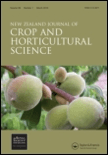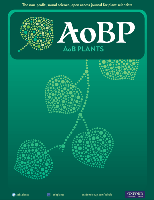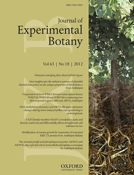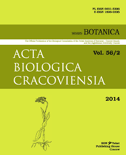
Horticulture Environment and Biotechnology
Scope & Guideline
Exploring the Intersection of Nature and Technology
Introduction
Aims and Scopes
- Plant Biotechnology and Genetic Engineering:
Research on the genetic manipulation of plants for improved traits such as disease resistance, yield, and stress tolerance, utilizing techniques like CRISPR/Cas9 and other genomic approaches. - Environmental Stress Responses:
Studies focusing on how plants respond to various abiotic stresses such as drought, salinity, and temperature extremes, including physiological, biochemical, and molecular mechanisms. - Postharvest Biology and Technology:
Investigations into the postharvest handling and storage of horticultural products, aiming to extend shelf life and maintain quality through various treatments and technologies. - Plant Physiology and Metabolism:
Research that examines the physiological processes in plants, including photosynthesis, nutrient uptake, and secondary metabolite production, often under varying environmental conditions. - Crop Management and Sustainable Practices:
Exploration of agricultural practices that enhance crop yield and quality while promoting sustainability, including organic farming, precision agriculture, and integrated pest management. - Genetic Diversity and Conservation:
Studies focused on assessing genetic diversity within and among horticultural species, contributing to conservation strategies and breeding programs. - Plant-Microbe Interactions:
Research on the relationships between plants and microorganisms, including beneficial interactions that promote plant growth and health.
Trending and Emerging
- Advanced Genomic Techniques:
There is a notable increase in research utilizing genomic techniques, such as whole-genome sequencing and marker-assisted selection, to enhance breeding programs and improve crop traits. - Sustainable and Precision Agriculture:
Emerging studies focus on sustainable agricultural practices and precision farming technologies, which aim to optimize resource use and minimize environmental impact. - Plant Responses to Climate Change:
Research examining how climate change affects plant physiology and horticultural practices is on the rise, highlighting the need for adaptive strategies in horticulture. - Innovative Postharvest Technologies:
An increasing number of studies are dedicated to novel postharvest treatments and technologies that enhance fruit and vegetable preservation, reflecting a priority on reducing food waste. - Utilization of Plant Growth-Promoting Microorganisms:
Research into the use of beneficial microbes to enhance plant growth and resilience is trending, emphasizing the importance of soil health and microbiome interactions. - Smart Farming Technologies:
The integration of smart technologies, such as IoT and artificial intelligence, in horticulture is gaining traction, as researchers explore their potential to improve crop management and monitoring.
Declining or Waning
- Traditional Breeding Techniques:
There appears to be a waning interest in traditional breeding methods as genomic and biotechnological approaches gain traction, leading to fewer publications on conventional cross-breeding practices. - Non-Genetic Pest Control Methods:
Research on traditional pest control methods, such as manual removal and basic chemical treatments, has decreased as the emphasis shifts toward integrated pest management and biocontrol strategies. - Basic Horticultural Practices:
Studies focusing solely on basic horticultural practices without integrating biotechnological advances or environmental considerations are becoming less frequent, indicating a shift towards more innovative and complex research.
Similar Journals

aBIOTECH
Transforming ideas into groundbreaking solutions in life sciences.aBIOTECH, published by SPRINGERNATURE, is a premier academic journal dedicated to advancing the fields of biotechnology, agronomy, and molecular biology. With an impressive ISSN of 2096-6326 and E-ISSN 2662-1738, this journal has established itself as a vital resource for researchers and professionals aiming to publish high-quality, impactful studies. Based in Singapore, aBIOTECH has achieved remarkable recognition, boasting a Q1 ranking in multiple categories including Agronomy and Crop Science, Biochemistry, and Genetics in the 2023 Scopus rankings. Its solid position in the 90th percentile for Biochemistry and Genetics reinforces its significance within the global scientific community. The journal covers a broad spectrum of topics relevant to both basic and applied research, facilitating a shared dialogue amongst scientists and encouraging collaborative progress in innovative biotechnological applications. The open-access nature of the journal ensures that cutting-edge research is freely available, fostering a global exchange of ideas that is critical to the advancement of science today.

PHYSIOLOGY AND MOLECULAR BIOLOGY OF PLANTS
Enhancing Crop Production with Cutting-Edge ResearchPHYSIOLOGY AND MOLECULAR BIOLOGY OF PLANTS, published by SPRINGER, is a vital journal focused on the advancing field of plant science. Featuring research that spans physiology, molecular biology, and their applications in agriculture, this journal is pivotal for academics, professionals, and students keen on understanding plant processes and enhancing crop production. With an ISSN of 0971-5894 and an E-ISSN of 0974-0430, this journal is recognized for its scholarly significance, ranking in the Q3 category in Molecular Biology, Q2 in Physiology, and Q1 in Plant Science as of 2023. The journal maintains a strong position in the Scopus rankings, with notable percentile rankings including 87th in Plant Science. Established in 2000, this publication aims to foster the dissemination of cutting-edge research by providing a platform for open discussion and knowledge sharing about plant physiology and molecular mechanisms. While it does not currently offer open access options, its comprehensive studies and reviews serve as an essential resource for enhancing our understanding of plant biology.

BIOLOGIA PLANTARUM
Fostering Collaboration in Plant Science ExcellenceBIOLOGIA PLANTARUM, esteemed within the realms of horticulture and plant science, is a leading academic journal published by the Academy of Sciences of the Czech Republic, Institute of Experimental Botany. Established in 1959, this journal showcases innovative research and advancements in plant biology, focusing on a spectrum of topics including plant physiology, genetics, and biotechnology. With an impressive Scopus ranking in Horticulture (Rank #41/115) and Plant Science (Rank #221/516), it holds a significant place in the academic community, reflected in its Q2 and Q3 status within its respective categories. Although it is not open access, authors are encouraged to contribute to the growing body of knowledge that supports sustainable practices in agriculture and horticulture. Published in the Netherlands, BIOLOGIA PLANTARUM continues to foster collaboration and dialogue among researchers, professionals, and students dedicated to understanding and advancing plant sciences.

EUROPEAN JOURNAL OF HORTICULTURAL SCIENCE
Advancing horticultural knowledge for a sustainable future.The European Journal of Horticultural Science, an esteemed publication of the International Society for Horticultural Science (ISHS), serves as a pivotal platform for advancing the field of horticulture since its inception in 2003. With its base in Germany, this journal occupies a significant position in the Q3 quartile of horticultural research, confidently ranked #60 out of 115 in the Agricultural and Biological Sciences category on Scopus, reflecting its relevance and impact within the scholarly community. The European Journal of Horticultural Science fosters open access to a wealth of research and insights, facilitating knowledge sharing among researchers, professionals, and students dedicated to the innovative and sustainable practices in horticultural science. As it embarks on a new chapter through its convergence years leading up to 2024, the journal aims to enhance the dialogue on contemporary horticultural challenges and advancements, making it an essential resource for those seeking to contribute to and learn from ongoing developments in this vital field.

Tropical Plant Biology
Illuminating the Richness of Tropical Plant BiologyTropical Plant Biology is a premier academic journal published by Springer, dedicated to advancing the understanding of tropical plants and their ecological significance. With an ISSN of 1935-9756 and an E-ISSN of 1935-9764, this journal serves as a vital platform for researchers, professionals, and students focused on the fields of Genetics and Plant Science. Notably recognized in 2023 as a Q2 journal in Plant Science and Q3 in Genetics, it ranks 171st out of 516 in Agricultural and Biological Sciences and 227th out of 347 in Genetics according to Scopus. The journal encompasses a diverse range of topics, offering insights into tropical plant biology, ecology, conservation, and biodiversity. Although it does not currently operate under an open-access model, it remains an essential resource for anyone passionate about tropical ecosystems and their intricate relationships. With contributions spanning from 2009 to 2024, Tropical Plant Biology continues to foster scholarly discourse and innovation in the field.

NEW ZEALAND JOURNAL OF CROP AND HORTICULTURAL SCIENCE
Cultivating Knowledge in Crop and Horticultural ScienceThe New Zealand Journal of Crop and Horticultural Science, published by Taylor & Francis Ltd, stands as a key resource in the fields of Agronomy and Horticulture, with a commendable impact factor reflecting its quality and influence in the scientific community. Since its inception in 1989, this journal has been committed to advancing our understanding of crop development and horticultural practices, catering not only to researchers and professionals but also to students eager to delve into the intricacies of plant sciences. With a Q3 ranking in both Agronomy and Crop Science and Horticulture as of 2023, the journal occupies a significant position within the agricultural and biological sciences domain, significantly contributing to the body of knowledge in these fields. The journal features original research, reviews, and technical notes that cover a wide range of topics, ensuring a comprehensive perspective on contemporary and emerging agricultural issues. For individuals interested in accessing cutting-edge research, the journal provides subscription-based access, further enhancing its scholarly contributions.

AoB Plants
Unlocking the potential of plants for future generations.AoB Plants is a distinguished open-access journal published by Oxford University Press, dedicated to advancing the field of plant science. Since its inception in 2009, this journal has played a pivotal role in disseminating high-quality research that encompasses a wide range of topics including plant biology, ecology, and biotechnology. With an impressive impact factor and a ranking in the Q1 quartile for Plant Science, AoB Plants is recognized for its innovative contributions and scholarly rigor, ranking #129 out of 516 in the Scopus Agricultural and Biological Sciences category, placing it in the 75th percentile among its peers. By promoting open-access availability of research findings, the journal empowers researchers and practitioners alike, facilitating greater collaboration and knowledge sharing in the global scientific community. Situated in the heart of the United Kingdom, AoB Plants continues its commitment to providing a platform for pioneering research and developments in plant science, thus fostering a deeper understanding of the crucial roles that plants play in our ecosystems and economies.

JOURNAL OF EXPERIMENTAL BOTANY
Illuminating the path of plant research innovation.JOURNAL OF EXPERIMENTAL BOTANY, published by Oxford University Press, stands as a premier journal for researchers and professionals in the fields of plant science and physiology. With an illustrious history dating back to 1950, this journal has established itself as a critical resource for advancing our understanding of plant biology and its applications. It is recognized in the top tier of academic publishing, reflected in its Q1 rankings in both Plant Science and Physiology for 2023, and boasts impressive Scopus rankings—placing it in the 96th and 91st percentiles of its respective categories. Though not an open-access journal, it ensures widespread access to groundbreaking research aimed at unraveling the complexities of plant functions and adaptations. As we look toward 2024, the JOURNAL OF EXPERIMENTAL BOTANY continues to play an essential role in fostering innovation, collaboration, and education within this vital area of science.

ACTA BIOLOGICA CRACOVIENSIA SERIES BOTANICA
Unveiling the secrets of the plant kingdom, one study at a time.ACTA BIOLOGICA CRACOVIENSIA SERIES BOTANICA is a distinguished journal published by the Polska Akademia Nauk (Polish Academy of Sciences), with its roots tracing back to 1996. As a pivotal publication in the field of Plant Science, it serves to disseminate high-quality research and findings, contributing to the ongoing development and understanding of biodiversity, plant ecology, and conservation. The journal is indexed under Scopus, ranked #203 out of 516 in its category, placing it in the 60th percentile and firmly within Q3 quartile for Plant Science in 2023. Researchers, professionals, and students will find invaluable content within its pages, enhancing their knowledge and supporting academic exploration. Although it currently does not offer open access options, the journal remains a crucial resource for those engaged in botanical sciences, with a commitment to advancing scholarship in Poland and beyond.

Annual Plant Reviews Online
Empowering Knowledge in Plant SciencesAnnual Plant Reviews Online, published by WILEY, serves as a premier academic resource dedicated to the evolving field of plant sciences, including specialties in agronomy, horticulture, and food science. With an impressive Q1 ranking in Horticulture and Q2 classifications in Agronomy, Crop Science, and Plant Science, this journal reflects a high standard of scholarly contribution, evidenced by its positioning in the 75th percentile range among agricultural and biological sciences in leading Scopus rankings. Aimed at researchers, professionals, and students alike, the journal covers a broad spectrum of plant-related topics and trends, aiming to enhance the understanding of plant biology and its applications. Offering timely insights and critical reviews, Annual Plant Reviews Online connects the global community with essential knowledge, supporting advancements in sustainable practices and innovations in agriculture. Researchers and students can access its content seamlessly, contributing to ongoing discussions in plant science and fostering academic growth.